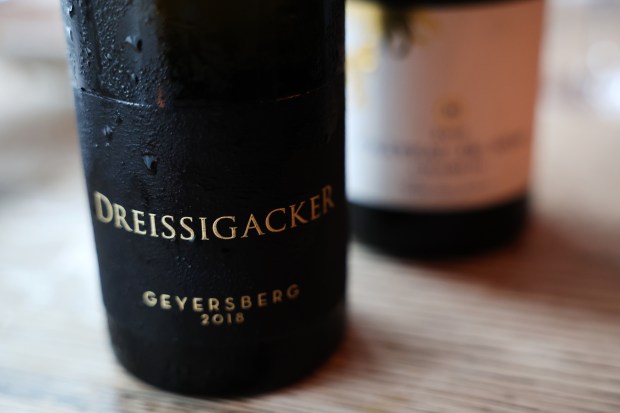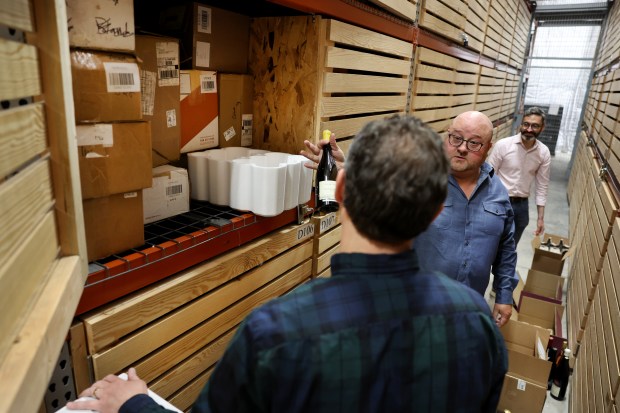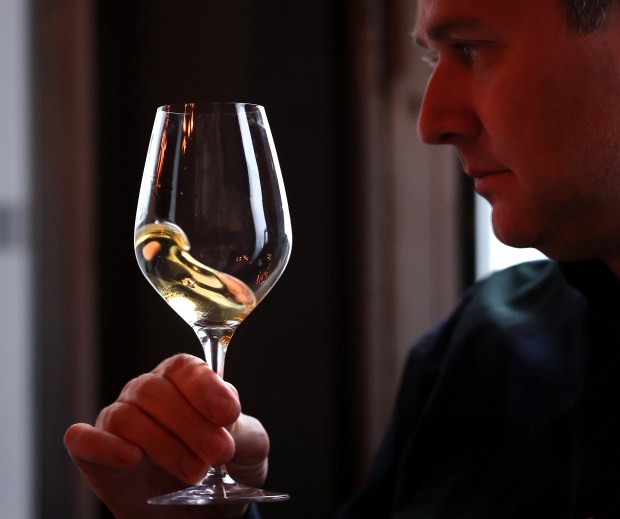As influencers go, Adam Caldwell and Patrick Rauber, the Chicago-based duo better known as RieslingKenner (that’s “riesling connoisseur” in German), are anything but typical. For starters, you won’t find them on TikTok showing off dance moves or sabering Champagne bottles. And because they’re rarely in front of the camera themselves, even longtime followers would be hard-pressed to recognize them on the street.
Since 2020, RieslingKenner has quietly assumed the role of an evangelist for Germany’s most underappreciated wines — riesling, of course, but also spätburgunder (pinot noir), weissburgunder (pinot blanc), chardonnay and more. They haven’t gotten around to setting up a website yet. Instead, RieslingKenner relies primarily on Instagram to communicate with their small but dedicated cohort of roughly 3,000 followers who tune in for bottle shots captioned with thoughtful notes and occasional event postings.
It’s a niche pursuit. Yet within the close-knit world of German wine lovers, Caldwell and Rauber have built an outsize reputation. And thanks in part to their efforts, Chicago now emerges as an unexpected hub for German wines, chief among them, the perennial underdog, silvaner.
Who is RieslingKenner?
Caldwell and Rauber describe themselves as passionate wine lovers who enjoy hosting wine-focused dinners and events. Caldwell, a lifelong Chicagoan, runs a corporate recruiting firm, while Rauber, an architect, moved to Chicago over a decade ago. Neither has worked in the wine industry. Neither holds any wine certifications, nor do they aspire to become sommeliers. “None of that stuff,” says Caldwell.
They first connected six years ago over a shared appreciation of wines from Barolo, Barbaresco and Burgundy. But when Rauber, a longtime riesling enthusiast, introduced Caldwell to German wines, “he fell into it head over heels,” Rauber recalls.
German wines are fiercely championed by wine professionals and collectors but they’ve often struggled to gain wider traction in the US market. Much of the challenge, quite simply, lies in the German language — American consumers tend to be dissuaded by unfamiliar grape names, complex labels and Germany’s famously intricate classification system.
Yet unapologetically distinct and frequently misunderstood, German wines “just felt like the punk rock of wine,” Rauber explains. Compared with the saturation of wines from France, Italy or the United States, “there was an underserved space for German wine,” he says.
As RieslingKenner, the duo have been outspoken in their promotion of the kind of wines that fuel their obsession, typically those made by young, ambitious winegrowers across Germany, “producing world-class wines,” but often “at prices far less than counterparts coming out of say, Burgundy or Bordeaux,” says Rauber.

Beyond just social media posts, they’ve sought to provide regular consumers better access to these typically handcrafted, limited production wines. Each year, the duo organizes four tasting events, such as a vintage preview of the Mosel winery Hofgut Falkenstein’s entire lineup of wines. “We’re the only people in the world to do that outside of the winery,” says Rauber.
The horizontal tasting of nearly 24 wines from the small, family-run estate in the Saar region of the Mosel draws not only riesling fans from across the country to Chicago, but also Falkenstein’s winemaker, Johannes Weber, from Germany to present the wines in person.
The underlying privilege of hosting wine-soaked extravaganzas isn’t lost on the pair. “We drive to these fantastic restaurants in Chicago for $300 dinners, passing people who don’t have anything to eat,” Caldwell says.
Although RieslingKenner isn’t a charitable organization, they collaborate with local nonprofits like the Trotter Project and Bigger Table as well as food banks throughout Chicago, Texas and Mexico. It’s important that “all proceeds from our events go directly to charities,” Caldwell says, particularly in support of food security and community uplift.
Silvaner Summit returns
Whether stateside or in Germany, the RieslingKenner event that’s gotten the most buzz, or perhaps, incredulity, is their Silvaner Summit, which returns to Chicago this week for its second year.
If you’ve never heard of silvaner (spelled Sylvaner in French-speaking regions), you’re not alone. While cultivated throughout Germany and in limited quantities throughout continental Europe, the diminutive white grape, often compared to grüner veltliner or an unoaked chardonnay, rarely gets much attention.
Beyond a few key regions like Franken in Germany or Alsace in France, it’s “a grape that’s historically been dismissed as incapable of making interesting wine,” says New York Times wine critic Eric Asimov, a keynote speaker at this year’s summit. “But as growers have taken it more seriously, planting it in the right places and farming it conscientiously, we’re starting to see just how good silvaner can be and how much unexplored potential there is.”
To be fair, the summit caters to “a hardcore nerd contingent,” says Evan Spingarn, a portfolio manager for David Bowler Wine and one of 10 importers supporting the event. “Silvaner isn’t the kind of grape you can organize like, a La Paulée around,” says Spingarn, referencing the marquee Burgundy spectacle held annually in New York and San Francisco.” “But it’s compelling as a grape that needs defenders,” he says.

Caldwell and Rauber have proudly taken on that challenge. It’s such an unsung grape, Rauber describes, “but made with the love and attention it deserves, it has the potential of becoming a superstar.”
“It’s such a textural, interesting wine, I can’t think of any other grape that reflects its origin and its terroir” the way silvaner can, he says.
In a city that embraces its underdog identity, could silvaner find unique footing in Chicago?
“Chicago is forever the second city, right?” quips Spingarn, a former resident. “It’s the scrappy underdog with all these hidden gems that not everyone knows about,” he says, “so yes, maybe Chicago is a good place for silvaner to land.”
It’s all exciting news for winegrowers like Andrea Wirsching, the 14th-generation owner of Weingut Hans Wirsching in Franken. As one of silvaner’s most prominent and historic producers, Wirsching has spent much of her career introducing silvaner to the world. Last year, she booked a last-minute ticket to Chicago after hearing of the event.
“It was an outstanding experience,” says Wirsching. After all, silvaner “needs people like Patrick and Adam to really get things moving,” she says.
RieslingKenner’s second annual Silvaner Summit takes place May 18 at Verve Wine. This summit kicks off with a sold-out, two-part master class — a tasting led by winegrower Peter Leipold of Franken’s Weingut Leipold, followed by a discussion with Asimov and the master sommeliers Jessie Becker, Jim Bube and Élyse Lambert. The master class will be followed by a six-course dinner with silvaner pairings for which limited tickets are still available.
Anna Lee Iijima is a freelance writer.



